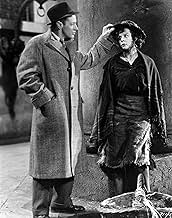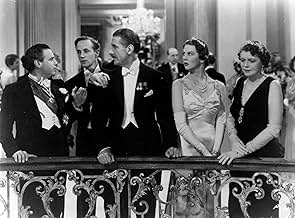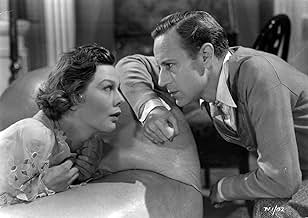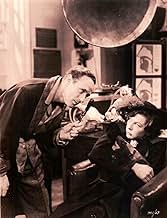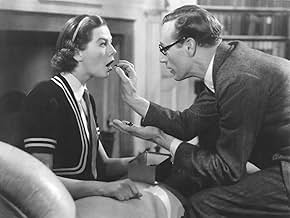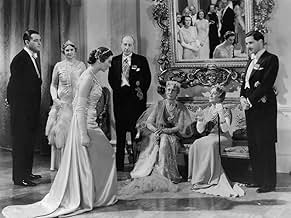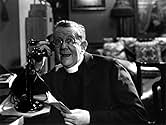CALIFICACIÓN DE IMDb
7.7/10
10 k
TU CALIFICACIÓN
Un experto en fonética y dicción apuesta a que puede enseñarle a una florista a hablar inglés correctamente y hacerse pasar por una dama de la alta sociedad.Un experto en fonética y dicción apuesta a que puede enseñarle a una florista a hablar inglés correctamente y hacerse pasar por una dama de la alta sociedad.Un experto en fonética y dicción apuesta a que puede enseñarle a una florista a hablar inglés correctamente y hacerse pasar por una dama de la alta sociedad.
- Dirección
- Guionistas
- Elenco
- Ganó 1 premio Óscar
- 4 premios ganados y 5 nominaciones en total
Leueen MacGrath
- Clara Eynsford Hill
- (as Leueen Macgrath)
Irene Browne
- Duchess
- (as Irene Brown)
Cathleen Nesbitt
- A Lady
- (as Kathleen Nesbitt)
Opiniones destacadas
After seeing Leslie Howard as Henry Higgins, there is no way I could find Rex Harrison half as appealing, with his chanting/singing, in My Fair Lady. Leslie Howard simply is Henry Higgins, and if he seems unappealing and unlikable, that's because he's supposed to be unappealing and unlikable -- Henry Higgins is not a nice man. Howard does an incredible job with the role, and Wendy Hiller's Eliza puts Audrey Hepburn, as lovely as she is, to shame.
If George Bernard Shaw thought that Howard's interpretation of his play was good, then who are we to argue?
If George Bernard Shaw thought that Howard's interpretation of his play was good, then who are we to argue?
Even if I had not yet seen this film I'd have had good reason to assume its merit simply because George Bernard Shaw, as cantankerous and protective of his work as he was, liked it. But I have seen it, many times, and that only validates that conclusion.
Leslie Howard not only starred in it but co-directed as well, and accomplished both magnificently. His rapid-fire intensity, conveying the true overbearing Higgins using Eliza as if she were "a block of wood," to quote, to be sawed, hewn, nailed, drilled and pounded into an object to his liking, is wonderfully complemented by Wendy Hiller's Eliza, bringing us to understand the full range of her growth from the depths of her imprisonment in the class of the street vendor barely escaping mendacity by selling flowers to a real princess, not by royal birth, but by her strength and accomplishment. Higgins may like to claim credit for her transformation; but it's Eliza who really made it happen.
There's a lot said here comparing Pygmalion to My Fair Lady. That's really a classic apples-and-oranges fallacy. Musical theatre is an entirely different art form, with a different goal. It's clear that if this interpretation of Pygmalion had been duplicated with songs and dances tacked on, it would have been horrible; yet My Fair Lady is a triumph of its art. It's often called a musical adaptation. That's mistaken; it's "based on" Pygmalion. The nature of musical theatre requires a different approach. To evaluate either by the standards of the other is a waste of time and thought.
Shaw would undoubtedly have hated MFL; his revulsion for Romanticism and the failure of The Chocolate Soldier, the operetta based on Arms and the Man, would guarantee that. MFL is not a musical Pygmalion, and should never be mistaken for one.
It is a great tribute to the genius of George Bernard Shaw and his best-known play that it could spawn both this artful and powerful movie version and a greatly different and beautiful musical as well.
Leslie Howard not only starred in it but co-directed as well, and accomplished both magnificently. His rapid-fire intensity, conveying the true overbearing Higgins using Eliza as if she were "a block of wood," to quote, to be sawed, hewn, nailed, drilled and pounded into an object to his liking, is wonderfully complemented by Wendy Hiller's Eliza, bringing us to understand the full range of her growth from the depths of her imprisonment in the class of the street vendor barely escaping mendacity by selling flowers to a real princess, not by royal birth, but by her strength and accomplishment. Higgins may like to claim credit for her transformation; but it's Eliza who really made it happen.
There's a lot said here comparing Pygmalion to My Fair Lady. That's really a classic apples-and-oranges fallacy. Musical theatre is an entirely different art form, with a different goal. It's clear that if this interpretation of Pygmalion had been duplicated with songs and dances tacked on, it would have been horrible; yet My Fair Lady is a triumph of its art. It's often called a musical adaptation. That's mistaken; it's "based on" Pygmalion. The nature of musical theatre requires a different approach. To evaluate either by the standards of the other is a waste of time and thought.
Shaw would undoubtedly have hated MFL; his revulsion for Romanticism and the failure of The Chocolate Soldier, the operetta based on Arms and the Man, would guarantee that. MFL is not a musical Pygmalion, and should never be mistaken for one.
It is a great tribute to the genius of George Bernard Shaw and his best-known play that it could spawn both this artful and powerful movie version and a greatly different and beautiful musical as well.
10ted puff
Perfect cinema. That was my reaction when I first saw Pygmalion, the first of 50 viewings and counting, and I still think so. Who could not fall in love with Leslie Howard, one of our greatest actors, so tragically assassinated in the Second World War? Wendy Hiller IS Eliza. The cast is flawless. The script... words fail me, for George Bernard Shaw was a genius, he did not simply adapt his play for the screen, it is so good that it is like it's happening before your eyes. My God, after seeing this is there anyone out there who thinks 'My Fair Lady', the slowest film musical on record, is the best screen version of Shaw? If they do, they are mad.
That film moves me not one jot, everything is so clean, so smug, so unreal. Here we see poverty, but also hope. These are not actors and actresses moving through the sets garbed in Cecil Beaton, but real people, real suffering, but humanity lights every scene like a beacon. The unbearably moving scenes of Eliza capturing society at the ball, the irresistible waltz, watch this with no tears in your eyes, I dare you. Halliwells Film Guide calls this 'one of the most heartening and adult British films of the thirties'. Too right. I cannot fault this film, it is priceless. By the way, I saw 'My Fair Lady' on stage recently, and it's miles better than the film version. Warner Bros really let Shaw down, and it's impossible to put it right. But this...well it is a big compensation. And I don't miss the songs one little bit.
There are so many classic scenes I can't pick any out. Of course viewers will spot that it was 'updated' to 1938, and the original play set in the Edwardians. That doesn't hurt it at all, 'polite' society didn't change much in the intervening years and gives the play an added 'contemporary' edge. Please, please, please see this film. You will be gripped.
That film moves me not one jot, everything is so clean, so smug, so unreal. Here we see poverty, but also hope. These are not actors and actresses moving through the sets garbed in Cecil Beaton, but real people, real suffering, but humanity lights every scene like a beacon. The unbearably moving scenes of Eliza capturing society at the ball, the irresistible waltz, watch this with no tears in your eyes, I dare you. Halliwells Film Guide calls this 'one of the most heartening and adult British films of the thirties'. Too right. I cannot fault this film, it is priceless. By the way, I saw 'My Fair Lady' on stage recently, and it's miles better than the film version. Warner Bros really let Shaw down, and it's impossible to put it right. But this...well it is a big compensation. And I don't miss the songs one little bit.
There are so many classic scenes I can't pick any out. Of course viewers will spot that it was 'updated' to 1938, and the original play set in the Edwardians. That doesn't hurt it at all, 'polite' society didn't change much in the intervening years and gives the play an added 'contemporary' edge. Please, please, please see this film. You will be gripped.
George Bernard Shaw wrote the play "Pygmalion" in 1912 and 1913 as part-social protest, part-satire, part-comedy of manners. Its central character, Henry Higgins, a London teacher of elocution and expert in regional phonetics, makes a small wager with his friend and colleague, Colonel George Pickering, that he can take a waif from the streets, one Eliza Doolittle, and pass her off as the cream of the social crop. Using a pedagogical technique consisting mostly of inhumane badgering and humiliation, he manages to pull off the feat with unexpected success – but at an emotional cost he does not foresee.
Besides the inventive montages illustrating Higgins' transformation of Eliza from Cockney flower-girl to the statuesque, gowned beauty who's mistaken for a royal princess at a diplomatic reception, there are additional items that failed to materialize in Shaw's original – the use of the phrases, "The rain in Spain stays mainly in the plains" and "Hurricanes hardly happen in Hartford, Hereford, and Hampshire," both of which later became lyrics for Lerner and Lowe's musical version. And in the play, Higgins's irritating Hungarian nemesis is not given a name; here, for the first time, he is dubbed "Kaparthy."
Leslie Howard, who co-directed this 1938 film, impersonates Higgins as hard-core realist - diabolical, profane, impatient, sometimes maddening. And as Eliza, Wendy Hiller has her coy moments, particularly when she is "tried out" at a tea party given by Higgins's mother. Her carefully high-toned enunciation of "the new slang" is timed to perfection.
The film, unfortunately, leaves one with the feeling that at the story's conclusion - with Higgins quietly demanding to know from Eliza the whereabouts of his slippers - both student and mentor "live happily ever after." This contrived ending must have been a compromise on the part of the producer, Gabriel Pascal, although one finds it mystifying that Shaw, who is credited with the story's adaptation, would have ever endorsed such a sentimental ending. For as Shaw had written at the end of his play over two decades earlier, "the rest of the story need not be shown...if our imaginations were not so enfeebled by their lazy dependence on the...reach-me-downs of the rag shop in which Romance keeps its stock of happy endings..." The playwright then proceeded into seven pages of prose, describing an epilogue in which Eliza married the worshipful young suitor, Freddy Eynsford-Hill, and the generous Colonel Pickering set up the newlyweds in their own business near Victoria Station. As for any relationship between Higgins and Eliza, according to Shaw, "(to this day) he storms and bullies and derides; but she stands up to him so ruthlessly that the Colonel has to ask her from time to time to be kinder to Higgins." As is the aftermath of most good stories, the worm indeed did turn.
With Wilfrid Lawson as Eliza's father, Alfred; Scott Sunderland as Pickering; and David Tree impersonates the shallow but inoffensive Freddy in high style. (He would do the same with the role of Charles Lomax three years later in "Major Barbara.") If the American schleps and male-pushovers that Ralph Bellamy used to play in "The Awful Truth" and "His Girl Friday" ever had a British cousin, David Tree was it; he did the upper-class twit better than anyone.
Besides the inventive montages illustrating Higgins' transformation of Eliza from Cockney flower-girl to the statuesque, gowned beauty who's mistaken for a royal princess at a diplomatic reception, there are additional items that failed to materialize in Shaw's original – the use of the phrases, "The rain in Spain stays mainly in the plains" and "Hurricanes hardly happen in Hartford, Hereford, and Hampshire," both of which later became lyrics for Lerner and Lowe's musical version. And in the play, Higgins's irritating Hungarian nemesis is not given a name; here, for the first time, he is dubbed "Kaparthy."
Leslie Howard, who co-directed this 1938 film, impersonates Higgins as hard-core realist - diabolical, profane, impatient, sometimes maddening. And as Eliza, Wendy Hiller has her coy moments, particularly when she is "tried out" at a tea party given by Higgins's mother. Her carefully high-toned enunciation of "the new slang" is timed to perfection.
The film, unfortunately, leaves one with the feeling that at the story's conclusion - with Higgins quietly demanding to know from Eliza the whereabouts of his slippers - both student and mentor "live happily ever after." This contrived ending must have been a compromise on the part of the producer, Gabriel Pascal, although one finds it mystifying that Shaw, who is credited with the story's adaptation, would have ever endorsed such a sentimental ending. For as Shaw had written at the end of his play over two decades earlier, "the rest of the story need not be shown...if our imaginations were not so enfeebled by their lazy dependence on the...reach-me-downs of the rag shop in which Romance keeps its stock of happy endings..." The playwright then proceeded into seven pages of prose, describing an epilogue in which Eliza married the worshipful young suitor, Freddy Eynsford-Hill, and the generous Colonel Pickering set up the newlyweds in their own business near Victoria Station. As for any relationship between Higgins and Eliza, according to Shaw, "(to this day) he storms and bullies and derides; but she stands up to him so ruthlessly that the Colonel has to ask her from time to time to be kinder to Higgins." As is the aftermath of most good stories, the worm indeed did turn.
With Wilfrid Lawson as Eliza's father, Alfred; Scott Sunderland as Pickering; and David Tree impersonates the shallow but inoffensive Freddy in high style. (He would do the same with the role of Charles Lomax three years later in "Major Barbara.") If the American schleps and male-pushovers that Ralph Bellamy used to play in "The Awful Truth" and "His Girl Friday" ever had a British cousin, David Tree was it; he did the upper-class twit better than anyone.
While My Fair Lady was a tremendous film which is a pleasure to watch and rewatch, Pygmalion is the true cinematic version of Shaw's work and this version is brilliant. While I still have mixed feelings about the Henry-Eliza relationship and the play ending, it has to be said that the two leads here are perfect for their roles. There were not many British actors better than Howard at the time for this type of thing, and Wendy Hiller never disappointed her audience once in her long career. A good film full of detail and feeling. The one sticking point is the weak and feeble Freddie who at least was given a personality in MFL. Here you can't wonder that Eliza is so quick to discard his attentions. A film which should be celebrated and treasured more in the UK than it is.
¿Sabías que…?
- TriviaThe scene in which Eliza accidentally swallows a marble while having an elocution lesson does not appear in the original play. During rehearsals for this scene, a pained expression came over Wendy Hiller's face. When she spat out the marbles she had in her mouth, she said, "Leslie, I've swallowed one!" to which Leslie Howard replied, "Never mind, there are plenty more." This caused such amusement among the watching crew that it was added to the movie and to its musical version, Mi bella dama (1964).
- ErroresAfter the ball when Mrs. Pearce serves Professor Higgins his tea, the shadow of the camera can be seen in the bottom left, moving back across his blanket.
- Citas
Eliza Doolittle: Walk? Not bloody likely. I'm going in a taxi.
- Créditos curiososOpening credits prologue: PYGMALION WAS A MYTHOLOGICAL CHARACTER WHO DABBLED IN SCULPTURE. HE MADE A STATUE OF HIS IDEAL WOMAN-GALATEA. IT WAS SO BEAUTIFUL THAT HE PRAYED THE GODS TO GIVE IT LIFE. HIS WISH WAS GRANTED.
BERNARD SHAW IN HIS FAMOUS PLAY GIVES A MODERN INTERPRETATION OF THIS THEME.
- Versiones alternativasThis film was made a year before the Hays Office gave Clark Gable permission to say "Frankly, my dear, I don't give a damn", so while in the British prints of this film Leslie Howard often utters the word, in the American prints the word "damn" is replaced by either "hang" or "confounded".
- ConexionesFeatured in Metro-Goldwyn-Mayer's Big Parade of Hits for 1940 (1940)
Selecciones populares
Inicia sesión para calificar y agrega a la lista de videos para obtener recomendaciones personalizadas
- How long is Pygmalion?Con tecnología de Alexa
Detalles
- Fecha de lanzamiento
- País de origen
- Idioma
- También se conoce como
- Pygmalion
- Locaciones de filmación
- Pinewood Studios, Iver Heath, Buckinghamshire, Inglaterra, Reino Unido(studio: made at Pinewood Studios England)
- Productora
- Ver más créditos de la compañía en IMDbPro
Taquilla
- Presupuesto
- GBP 87,000 (estimado)
- Tiempo de ejecución1 hora 36 minutos
- Color
- Relación de aspecto
- 1.37 : 1
Contribuir a esta página
Sugiere una edición o agrega el contenido que falta


